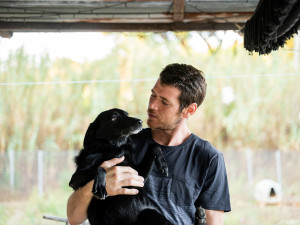Why Your Dog Doesn’t Bark: Possible Causes And What to Know
And what you can do about it.

Share Article
In This Article:
Most Common Reasons Your Dog Isn’t Barking Is It Normal For a Dog to Stop Barking? How to Know If a Lack of Barking Is a Problem And When to Seek Help
If silence is golden, then a dog who doesn’t bark may seem like a jackpot. No midnight woofing at a creaking house, no chorus of yaps when the doorbell rings, no outraged commentary for the squirrel community. Just peace, quiet, and … wait, should you be worried?
For many pet parents, a non-barking pup can feel like a mixed bag: oddly convenient, slightly suspicious, and puzzling. Isn’t barking Dog 101?
While barking may be one of the most iconic canine traits, not all dogs are vocal. Some are naturally quiet, while others may suddenly fall silent, raising red flags for their humans. If you’ve ever stared at your silent dog and wondered why they’re not barking, here’s your reason to investigate further.

Most common reasons your dog isn’t barking
Health issues
If your dog has suddenly stopped barking and was previously a vocal dog, a medical issue may be at play. Just as humans can lose their voice due to laryngitis, overuse, or illness, dogs can suffer from conditions that affect their vocal cords or respiratory system.
Laryngeal paralysis is one possible culprit. It’s a condition that affects the nerves controlling the larynx and can cause a raspy, weak, or absent bark altogether.
Other potential issues include upper respiratory infections, hypothyroidism, or even neurological conditions. And let’s not forget trauma: a recent surgery near the throat (such as for a collapsing trachea) or an incident involving choking or leash yanking can also cause damage that mutes your dog’s bark.
According to veterinarian Dr. Michelle Burch of Safe Hounds Pet Insurance, “Dogs can develop changes in vocalization due to inflammation, infection, trauma, or nerve damage.” If a pet parent “notices a sudden change,” she says, “they should contact their veterinarian for a full evaluation.”
If your dog is also lethargic, shows signs of pain, has difficulty breathing, or is acting out of character, silence may be a more serious symptom than a quirk.
The environment they’re in
Your dog may feel no need to bark. Dogs respond to their environment, and if they’re in a calm, quiet home with minimal stimulus (such as city noise, other dogs, or strangers constantly coming and going), they might not have much to say.
If you recently moved, changed your household dynamics, or adopted a dog from a shelter, your pup might still be in observation mode. Some rescue dogs are especially quiet for the first few weeks in a new home. It’s a survival tactic; they’re assessing their surroundings, figuring out if it’s safe to speak, and watching your cues. Give it time, and you might suddenly find them barking at dust mites with great enthusiasm.
Breed disposition or personality
Just like some people are introverts who prefer cozy silence over karaoke night, some dog breeds are naturally less vocal. Basenjis, famously nicknamed the “barkless dogs,” are anatomically unique in that their larynx doesn’t produce a traditional bark. (They do make an eerie yodeling sound called a “baroo,” so quiet doesn’t mean silent.)
Other quieter breeds include the Shiba Inu, Greyhound, Whippet, Akita, and even the Bulldog. Even within typically vocal breeds, some individuals are naturally quieter. Personality plays a significant role in how much a dog feels the need to communicate.
A 2020 study published in Scientific Reports linked canine personality traits to barking frequency, noting that dogs who were more anxious or highly excitable tended to bark more, while calm and secure dogs barked less.
Aging or a loss of energy
If your once-chatty companion has become quiet with age, it may be part of the natural aging process. Senior dogs often experience a dip in energy, sensory decline (including hearing or vision loss), or even cognitive dysfunction, which can all contribute to a decrease in barking.
It’s not that they don’t have anything to say; it’s more that the effort or stimulus required to say it doesn’t quite register the way it used to. Aging dogs may sleep more, react less, and overall shift into a gentler, quieter rhythm.
Keep an eye on other changes as well: disorientation, pacing, house-soiling, or a lack of interest in people and toys may signal canine cognitive dysfunction, sometimes referred to as “doggy dementia.” If you suspect this, bring it up with your vet.
Learned behaviors
Here’s a twist: your dog may be too well-behaved. Suppose you’ve previously corrected excessive barking through training methods such as positive reinforcement. In that case, your dog might have learned that silence earns them praise (or at least less drama).
Dogs are incredibly perceptive and eager to please. If barking leads to scolding, being ignored, or even isolation, many will eventually connect the dots: quiet equals good dog. Some dogs go a step further and suppress barking altogether if they’ve been punished for it too often.
On the other hand, dogs who were neglected or mistreated in their previous homes may have learned that barking only led to punishment, and they may avoid it altogether out of fear, even after being adopted into a loving family.
Is it normal for a dog to stop barking?
Yes, a quiet dog isn’t automatically a cause for concern. For naturally quiet breeds or personalities, silence is just their norm. If your dog has always been reserved or you're dealing with a recently adopted dog who’s still adjusting, silence may be part of their settling-in period.
What’s not normal is a sudden change in vocal behavior, especially if it’s paired with other symptoms. Dogs who stop barking and seem withdrawn, lethargic, disoriented, or physically uncomfortable should be evaluated.
Think of it like this: if your best friend suddenly stopped talking to you mid-sentence and stared blankly into the distance, you’d check in. Dogs may not use words, but their silence can speak volumes.
How to know if a lack of barking is a problem and when to seek help
If you're concerned, start by asking a few basic questions:
Has my dog always been quiet, or is this new?
Are they eating, drinking, and playing normally?
Has their bark changed in tone (raspy, hoarse, or strained)?
Are there any other changes in behavior, such as sleeping more, being less responsive, or limping?
Any combination of vocal change and behavioral or physical symptoms warrants a visit to the vet. They’ll likely check your dog’s throat and lungs, and possibly run blood work or X-rays to rule out neurological or endocrine disorders.
In the meantime, you can try to encourage vocalization through gentle play, commands like “speak,” or interactive toys. But never force it, especially if pain, fear, or anxiety is suspected. For some dogs, the most you’ll ever hear is a contented sigh or a soft huff — and that’s okay too.
Bottom line
Your dog not barking isn’t necessarily a red flag, but it can be a clue worth digging into. Whether it’s a quirk of their breed, a health concern, a learned behavior, or a reflection of their serene little soul, every dog communicates in their way. And sometimes, silence says more than a bark ever could.
So, if your dog is healthy, happy, and quietly judging the mailman from the window, maybe they’re just the strong, silent type. But if something feels off, trust your gut and remember, when it comes to your dog’s voice, you might be the one who has to speak up for them.
References:
Burch, Michelle. Safe Hounds Pet Insurance. “Why Is My Dog Not Barking?” Safe Hounds, https://safehounds.com/why-is-my-dog-not-barking/opens in new tab
Kaplan, Jessica. “The Quiet Canine: Legal Frameworks for Animal Expression.” Chicago Journal of International Law, vol. 1, no. 1, 2000, https://chicagounbound.uchicago.edu/cjil/vol1/iss1/17/opens in new tab
Salonen, Milla, et al. “Breed Differences in Dog Behaviour: A Factor Analysis of a Large Dataset.” Scientific Reports, vol. 10, no. 1, 2020, https://www.nature.com/articles/s41598-020-76839-5/opens in new tab
South Australia Dog and Cat Management Board. “Barking Problems: A Guide to Resolving Barking Issues with Dogs.” Government of South Australia, https://www.sa.gov/files/assets/main/v/1/acs/documents/barking-problems.pdf/opens in new tab

Valerie Mellema
Valerie Mellema has a Bachelor of Science in Agribusiness and Equine Industry from West Texas A&M University. She has been a professional writer for the past 20 years, covering a wide variety of pet health and care topics before founding a nonprofit focused on mental health in children and thoroughbred aftercare. She has four Border Collies and eight retired racehorses.
Related articles
![Border Collie dog peering behind white fence]()
Why Does My Dog Bark at the Mail Carrier?
How to get your pup and the mail carrier to be friends.
![Wiener dog barking out of window of blue truck]()
Why Do Dogs Bark in the Car?
What to do when your dog barks at everything from other cars to people.
![Dog barking on the sidewalk in front of a pink wall]()
How to Fix Your Dog’s Non-Stop Barking
You can live in a quiet house again.
![A man holding a dog with an unsure look on its face.]()
“Why Does My Dog Bark at Men?”
What to do when your dog barks at the men in your life.
![Beagle dog barking outside in the grass.]()
New AI Technology Can Help Decode Dog Barks
The tech may help us better understand our pups.
![Dog Barking In Nature Next To Its Owner.]()
Getting Ads for Anti-Barking Devices? Here’s Why You Shouldn’t Buy One
Two trainers advocate against using these devices—here’s why.








